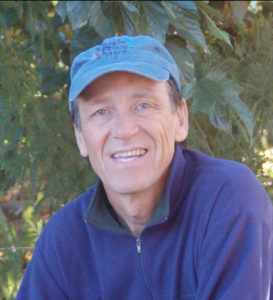Bonus Episode 7: Seed Chat August 2017.
A chat with an expert on Seeds, Bill McDorman.
In This BONUS Podcast:
There is always a bounty of information available in conversations with Bill McDorman. This is the August 2017 episode with a Seed School Chat Class covering Seed School Teacher Training, a proposed Seed Saving Principles list, disaster planning, breeding program preparation, and so much more.
Bill McDorman is Executive Director of Rocky Mountain Seed Alliance, Ketchum, Idaho. He got his start in the bio-regional seed movement while in college in 1979 when he helped start Garden City Seeds. In 1984, Bill started Seeds Trust/High Altitude Gardens, a mail order seed company he ran successfully until it sold in 2013.
Don’t miss an episode! Click here to sign up for podcast updates
SHOW NOTES:
– Seed School Teacher Training
– Developing the Principles of Seed School
– Saving desirable vs. undesirable plant seeds
– Disaster planning – big and small
– Preparing for a breeding program
– Actions for plants with diseases
– Pesticide drift
– Seed latitude and longitude
– Seed School Teacher Training
– Million Seed Saver Concept
– Great American Seed Up in Phoenix
UrbanFarm.org/Bonus7
Bill’s proposal for the principles of seed school and seed saving:
- No one should suffer from hunger, food insecurity, or malnutrition
- The long term survival of the food system depends on seed diversity
- Every food crop seed is the result of thousands of years’ of human care, ritual, and story
- Seeds are gifts from our ancestors and should not be privatized
- With seeds we inherit a responsibility to care for and pass on seed diversity to future generations
- Seed diversity is most created in a dispersed and grassroots manner
- Seed education is fundamental to the creation and care of seed diversity
- Each region has a responsibility of a safety back-up outside its region for its seed diversity
- Seed stories must be preserved
- Save seeds!
Producer’s notes:
Here is a revised principles list from Bill:
1) No one should suffer from hunger, food insecurity or malnutrition.
2) The survival of the food system depends upon its seed diversity.
3) Every food crop seed is a gift resulting from thousands of years of human care and should not be privatized.
4) With seeds we inherit a responsibility to care for and pass on seed diversity to future generations.
5) More seed diversity is created when more gardeners and farmers save seeds.
6) Seed education is fundamental to the creation of more seed savers and thus more seed diversity.
7) Complicated rules to assure uniformity need not be applied to small scale seed saving for diversity.
8) Each region has a responsibility to provide safety back-up for its seed diversity.
9) Seed stories teach us how to care for our seeds and ourselves and must be preserved.
10) Do it. Save seeds.
Here is the link to the FREE webinar on Seed Saving Hacked at IWantToSaveSeeds.com.
Here is the link to the Seed School Online.
Here is the link to the Great American Seed-up held in Phoenix in the Fall.









